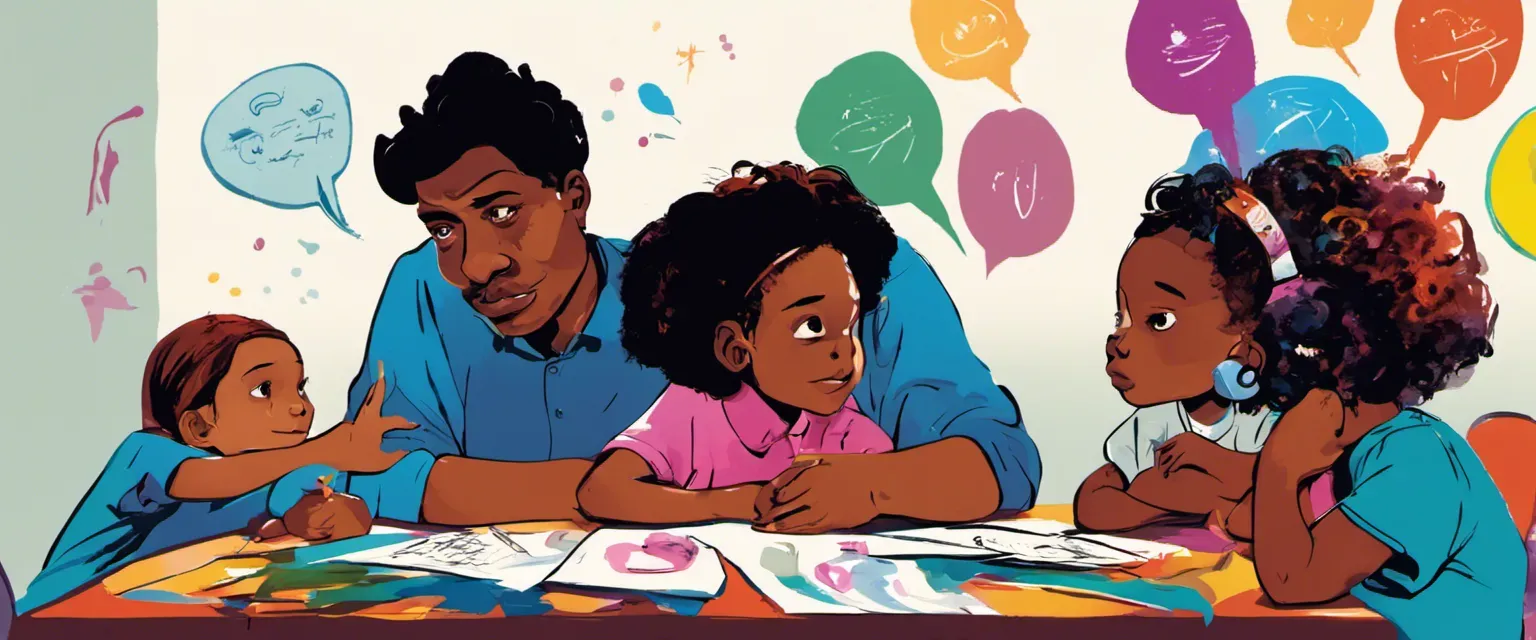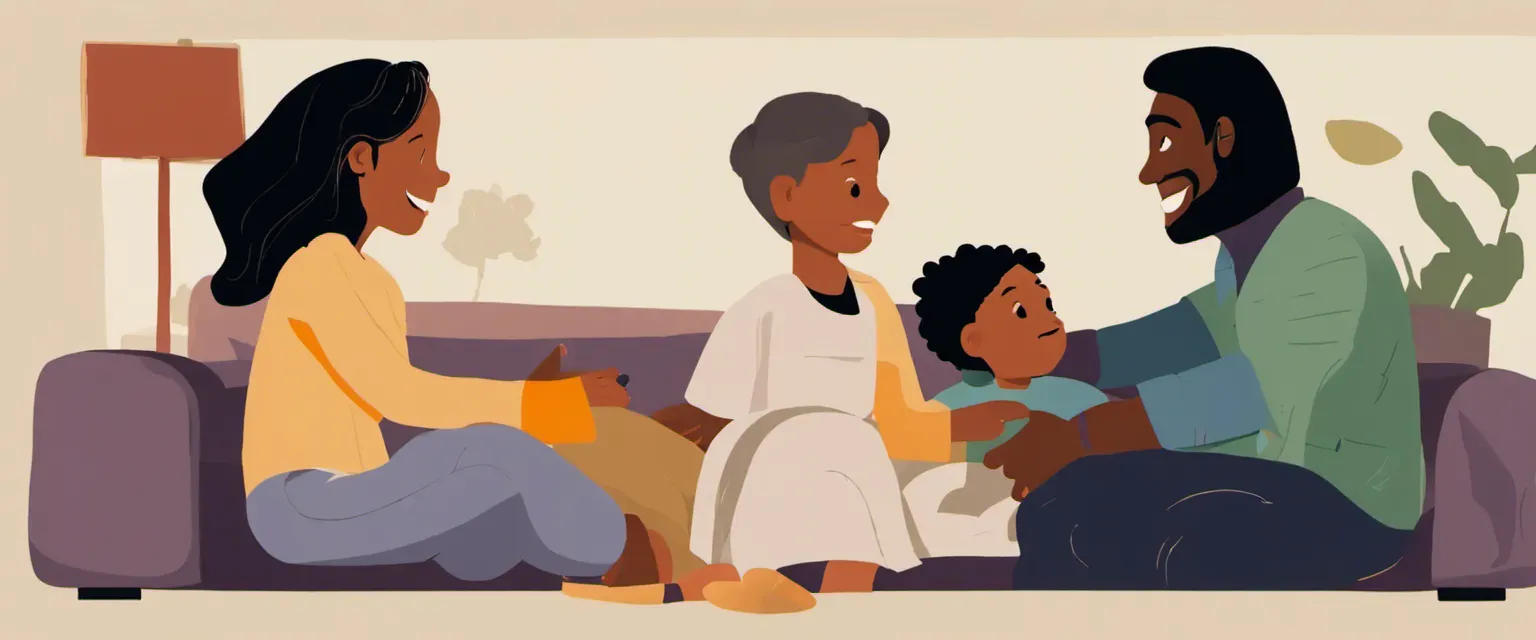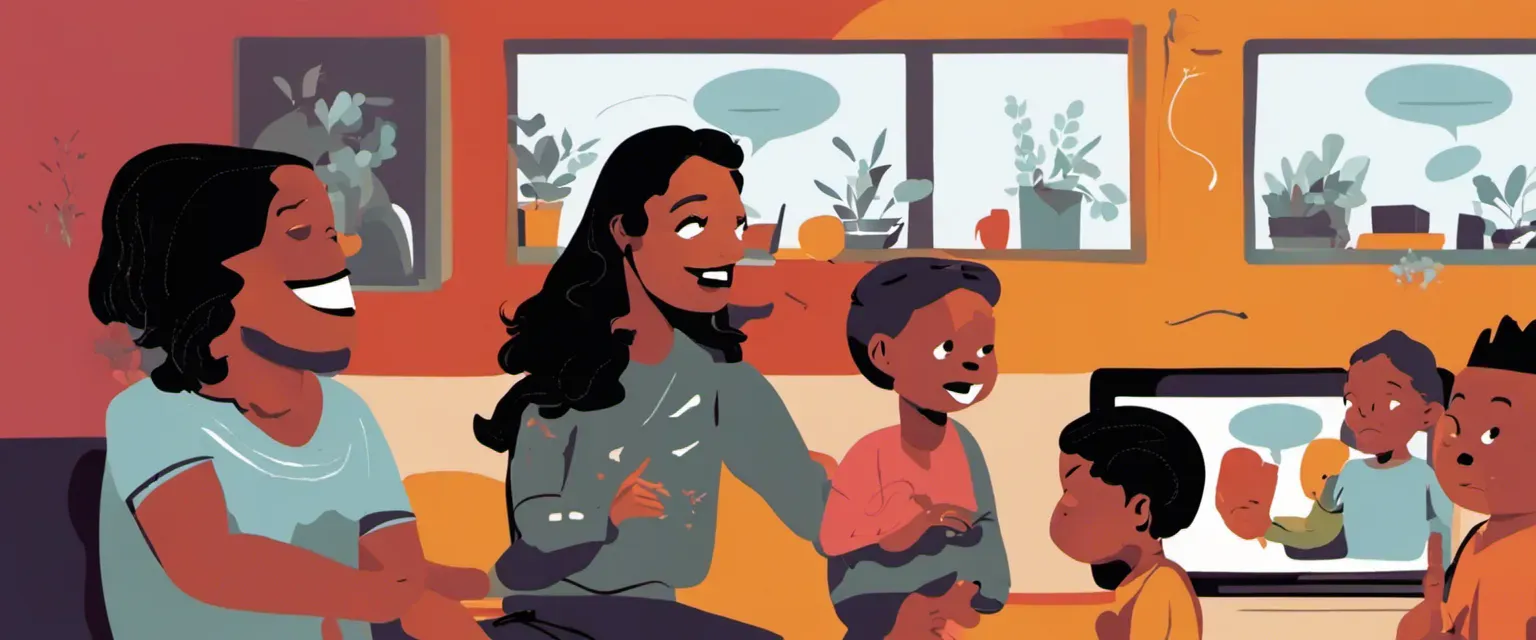How to Talk So Kids Will Listen: Essential Parenting Guide
"How to Talk So Kids Will Listen" is a practical guide offering effective communication strategies for parents and caregivers to foster better understanding and cooperation with children.
Chapter 1 What's How to Talk So Kids Will Listen
The book "How to Talk So Kids Will Listen & Listen So Kids Will Talk" by Adele Faber and Elaine Mazlish is a renowned parenting guide that offers practical tips and advice on how to effectively communicate and engage with children. The book provides strategies for resolving conflicts, improving cooperation, and nurturing the emotional well-being of children of different age groups. It focuses on building a positive parent-child relationship through empathy, active listening, and problem-solving techniques.
Chapter 2 Why is How to Talk So Kids Will Listen Worth Read
"How to Talk So Kids Will Listen" by Adele Faber is worth reading for several reasons:
- Practical advice: The book provides practical and effective techniques for improving communication between parents and children. It offers insights into how to better understand children's emotions, needs, and perspectives, which can help enhance the parent-child relationship.
- Easy to understand: The book is written in a clear and straightforward manner, making it accessible to both new and experienced parents. The concepts and strategies are presented in a relatable and relatable way, allowing readers to apply them to their own parenting situations easily.
- Positive and respectful approach: Faber emphasizes the importance of treating children with respect and dignity, validating their feelings, and acknowledging their autonomy. The book encourages positive discipline techniques that focus on problem-solving rather than punishment, creating a nurturing and supportive environment for the child.
- Wide range of scenarios: The book covers various challenging situations that parents commonly face, such as dealing with anger, sibling conflicts, homework, and discipline issues. It provides practical examples and step-by-step guidance on how to handle these situations effectively.
- Long-lasting impact: The techniques and strategies presented in the book can have a long-lasting impact on the parent-child relationship. By learning how to communicate effectively and empathetically, parents can build trust, foster cooperation, and promote healthy emotional development in their children.
Overall, "How to Talk So Kids Will Listen" is worth reading because it provides practical advice, promotes a positive and respectful approach to parenting, addresses a wide range of scenarios, and offers techniques that can have a long-lasting positive impact on the parent-child relationship.
Chapter 3 How to Talk So Kids Will Listen Summary
"How to Talk So Kids Will Listen & Listen So Kids Will Talk" is a book written by Adele Faber and Elaine Mazlish. It provides practical techniques and strategies for effective communication with children, aimed at promoting cooperation, problem-solving, and respectful relationships between parents and their kids.
The book starts by emphasizing the importance of treating children with respect, acknowledging their feelings, and facilitating healthy expression of emotions. It encourages parents to listen actively to their children, empathize with their experiences, and avoid dismissing or minimizing their emotions. By doing so, parents can create a safe and open dialogue with their kids, fostering trust and understanding.
The authors then introduce communication techniques that promote cooperation rather than conflict. They encourage the use of specific and descriptive praise, which focuses on the behavior or effort rather than general evaluation. This helps children develop intrinsic motivation and self-esteem.
Another technique introduced is the art of giving choices. By offering children options rather than imposing decisions on them, parents can empower kids to take responsibility and make constructive choices. This helps foster their independence and problem-solving skills.
The book also addresses common parenting challenges such as dealing with anger, discipline, and sibling rivalry. Faber and Mazlish provide practical strategies for managing conflicts and facilitating peaceful resolutions. They emphasize the importance of teaching children problem-solving skills, negotiating conflicts, and finding win-win solutions.
Throughout the book, Faber and Mazlish use real-life examples, dialogues, and illustrations to illustrate their communication techniques. The authors emphasize the importance of active listening, empathy, and utilizing non-judgmental language. They stress that effective communication is a two-way street, where both parents and children are active participants in the process.
In summary, "How to Talk So Kids Will Listen & Listen So Kids Will Talk" provides parents with valuable tools and strategies for building a positive and respectful relationship with their children. By adopting these techniques, parents can enhance communication, problem-solving, and cooperation with their kids, leading to healthier and more fulfilling parent-child relationships.
Chapter 4 How to Talk So Kids Will Listen Author
Adele Faber, born in 1928 and passed away in 2017, was an American author and parent educator. She was best known for her book, "How to Talk So Kids Will Listen & Listen So Kids Will Talk," which she co-authored with Elaine Mazlish. The book was first published in 1980 and has since become a renowned guide for parents and caregivers seeking effective communication techniques with children. It emphasizes respectful and empathetic communication as a means to build strong connections and resolve conflicts with kids.
Apart from "How to Talk So Kids Will Listen & Listen So Kids Will Talk," Adele Faber and Elaine Mazlish also collaborated on several other books, including:
- "Siblings Without Rivalry: How to Help Your Children Live Together So You Can Live Too" (1987) – This book explores techniques to promote sibling relationships without rivalry and reduce conflicts between children.
- "How to Talk So Teens Will Listen and Listen So Teens Will Talk" (2005) – Written specifically for communicating with teenagers, this book provides strategies to foster open and healthy dialogues with adolescents.
- "How to Be the Parent You Always Wanted to Be" (2013) – This guide offers practical advice for parents on topics such as setting boundaries, coping with emotions, and handling power struggles.
In terms of editions and popularity, "How to Talk So Kids Will Listen & Listen So Kids Will Talk" remains the most widely recognized and influential work by Adele Faber. It has been published in multiple editions and translated into numerous languages, making it widely accessible to parents worldwide.
Chapter 5 How to Talk So Kids Will Listen Meaning & Theme
How to Talk So Kids Will Listen Meaning
The book "How to Talk So Kids Will Listen" by Adele Faber provides guidance on effective communication with children. The main meaning of the book is to teach parents and caregivers effective strategies for communicating and connecting with children in a way that helps them feel understood, respected, and valued. It emphasizes the importance of empathy, active listening, acknowledging emotions, and problem-solving together. The book also aims to minimize power struggles, conflicts, and negative behaviors by fostering open and respectful communication. Overall, the book promotes a positive and constructive approach to communicating with children to build healthy relationships and enhance their emotional well-being.
How to Talk So Kids Will Listen Theme
The theme of "How to Talk So Kids Will Listen" by Adele Faber revolves around effective communication techniques that promote understanding, cooperation, and better relationships between adults and children. The book emphasizes the importance of treating children with respect, validating their feelings, and engaging them in problem-solving rather than imposing authority and commands. The overarching message is that by using active listening, empathizing, offering choices, and acknowledging emotions, adults can create an environment of trust and open communication where children feel heard, understood, and more likely to respond positively.
Chapter 6 Other Accessible Resources
- "How to Talk So Kids Will Listen & Listen So Kids Will Talk" Workbook: HOW TO TALK SO LITTLE KIDS WILL LISTEN – Parenting Book Summary
- "Siblings Without Rivalry: How to Help Your Children Live Together So You Can Live Too" by Adele Faber and Elaine Mazlish: This book, also written by Adele Faber and Mazlish, provides guidance on how to foster positive sibling relationships and prevent rivalry and conflict among children.
- "Parenting with Love and Logic" by Charles Fay and Foster Cline: This book offers a parenting approach that emphasizes empathy, understanding, and logical consequences to communicate effectively with children and promote their growth and independence.
- "The Whole-Brain Child: 12 Revolutionary Strategies to Nurture Your Child's Developing Mind" by Daniel J. Siegel and Tina Payne Bryson: This book explores the connection between neuroscience and parenting, providing practical strategies for helping children develop emotional intelligence and communication skills.
- "No-Drama Discipline: The Whole-Brain Way to Calm the Chaos and Nurture Your Child's Developing Mind" by Daniel J. Siegel and Tina Payne Bryson: In this book, Siegel and Bryson offer strategies for disciplining children without resorting to punishment, focusing on building connection, empathy, and effective communication.
- "How to Talk So Little Kids Will Listen: A Survival Guide to Life with Children Ages 2-7" by Joanna Faber and Julie King: This book, written by Adele Faber's daughter Joanna Faber and Julie King, provides practical advice and strategies specifically tailored to communicate effectively with young children.
- "Positive Discipline" by Jane Nelsen: This book offers a comprehensive approach to discipline that focuses on building mutual respect and cooperation between parents and children through effective communication, problem-solving, and setting clear boundaries.
- "Parenting from the Inside Out: How a Deeper Self-Understanding Can Help You Raise Children Who Thrive" by Daniel J. Siegel and Mary Hartzell: This book explores the impact of our own childhood experiences on our parenting style and provides insights into how to develop a more mindful and empathetic approach to raising children.
- "The Montessori Toddler: A Parent's Guide to Raising a Curious and Responsible Human Being" by Simone Davies: This book applies Montessori principles to toddlerhood, offering guidance on how to foster independence, self-discipline, and effective communication in young children.
- "The Explosive Child: A New Approach for Understanding and Parenting Easily Frustrated, Chronically Inflexible Children" by Ross W. Greene: This book provides a compassionate and proactive approach to parenting challenging children, offering strategies for problem-solving, conflict resolution, and effective communication.
Chapter 7 Quotes of How to Talk So Kids Will Listen
How to Talk So Kids Will Listen quotes as follows:
- "The point is not to be the perfect parent, but to be an authentic one."
- "Children deserve our respect and recognition as individuals with their own thoughts and feelings."
- "Instead of trying to control or manipulate our children's behavior, we should focus on understanding and empathizing with their emotions."
- "Praising our children's efforts and achievements can encourage them to develop a growth mindset."
- "When children misbehave, it is important to address the behavior rather than attacking their character."
- "Active listening is essential for effective communication with children. Give them your full attention, make eye contact, and show genuine interest in what they have to say."
- "Firmness with kindness is a powerful approach when setting boundaries and enforcing discipline."
- "Rather than criticizing or blaming, it is more helpful to express our concerns using ‘I’ statements that focus on the impact of the behavior on us."
- "Offering choices empowers children and gives them a sense of control, which can lead to more cooperation."
- "Using humor and playfulness can diffuse tension and make communication more enjoyable for both parents and children."
Chapter 8 Similar Books Like How to Talk So Kids Will Listen
- "Parenting with Love and Logic" by Charles Fay and Foster Cline
- This book offers practical techniques and strategies for parents to establish healthy boundaries and consequences while maintaining a loving connection with their children. "Parenting with Love and Logic" emphasizes empathy, effective communication, and allowing children to learn from their experiences.
- "Siblings Without Rivalry: How to Help Your Children Live Together So You Can Live Too" by Adele Faber and Elaine Mazlish
- Written by the same author as "How to Talk So Kids Will Listen," this book addresses the common issue of sibling rivalry and provides valuable advice for fostering a harmonious relationship between siblings. It offers practical tips for reducing conflict, improving communication, and nurturing positive sibling dynamics in your family.
- "The Whole-Brain Child: 12 Revolutionary Strategies to Nurture Your Child's Developing Mind" by Daniel J. Siegel and Tina Payne Bryson
- This book weaves together neuroscience research and practical advice to help parents better understand their children's brain development and create a nurturing environment that supports their overall well-being. It provides insights about how to foster emotional intelligence, build connection, and effectively navigate through challenging moments with kids.
- "Parenting from the Inside Out: How a Deeper Self-Understanding Can Help You Raise Children Who Thrive" by Daniel J. Siegel and Mary Hartzell
- In this insightful book, Siegel and Hartzell explore the idea that understanding our own childhood experiences and how they shaped us is crucial to becoming better parents. By delving into the emotional patterns and beliefs that influence our parenting style, this book aids in developing self-awareness, empathy, and mindful parenting techniques.
- "How to Raise an Adult: Break Free of the Overparenting Trap and Prepare Your Kid for Success" by Julie Lythcott-Haims
- In this thought-provoking book, the author challenges the prevalent helicopter parenting trend and encourages parents to empower their children to become independent, resilient, and self-sufficient individuals. Lythcott-Haims shares practical advice on fostering autonomy, embracing failure, and preparing kids for the real world, helping parents navigate the delicate balance between support and overprotection.
By exploring these five books, you will gain a comprehensive understanding of effective communication strategies, nurturing sibling relationships, brain development in children, self-awareness as a parent, and raising independent children. These recommendations will equip you with beneficial knowledge and practical tools to establish healthy connections with your children and promote their overall growth and development.





